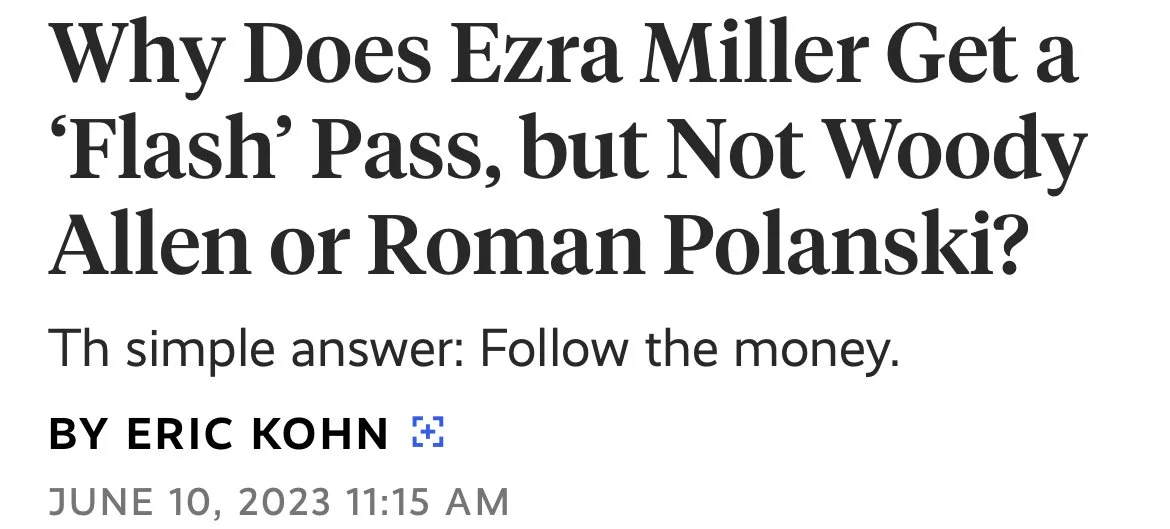An IndieWire writeup from Eric Kohn asks the question “Why Does Ezra Miller Get a ‘Flash’ Pass, but Not Woody Allen or Roman Polanski?”
The bigger question I have is why does Mia Farrow get a pass? But that’s a topic for a whole other, more wide-ranging discussion.
To answer Kohn’s question is to also have numerous theories behind the matter. Part of the reason Miller gets a free pass is because a major studio never bullied us into having to support Woody Allen and Roman Polanski, all for the sake of having one of their tentpole blockbusters make money.
Sure, one can say that Woody Allen and Roman Polanski both have new films potentially premiering at Venice in September, but we all know the outrage that will occur when/if that happens. It’ll be an unhinged onslaught of repercussion-based demands from the U.S. media. They won’t be happy.
Also, don’t expect Polanski and Allen’s latest to show up at Telluride, TIFF or NYFF. These North American programmers don’t want to deal with the repercussions of welcoming these two directors.
You might also ask, why isn’t Ezra being tried for his nationwide crime spree? I’ve mentioned numerous times the impressive lot of crimes he’s committed. Miller’s “adventures” are too many to list in just one article, but here goes: he choked a woman, was accused of grooming children, was arrested multiple times for punching people, committed armed robbery, oh, and he reportedly, and illegally, housed a mother and three young children on an unlicensed cannabis farm.
Polanski escaped the law, but Woody Allen was found innocent back in the ’90s. What gives? Maybe Ezra is being given a pass because he’s a member of the LGBTQ community and Hollywood is terrified to criticize him.
Kohn goes on to speculate about the potential quality of Allen’s latest film and how he’s torn between separating art from artist:
I have long felt that the discourse around Allen’s movies vs. what he did or didn’t do to be unworthy of endless scrutiny because the quality of his movies weren’t worth the battle either way. “Coup de Chance” presents a different kind of conundrum, because it looks… well, kind of good. Is that enough for U.S. buyers to take a chance on it? Even asking that question states the problem at hand.
“I bet no one will want the headache,” one American buyer tells Kohn. “I don’t think they’d give the rights away,” another one says.
However, I question the cancellation narrative in a world where Miller gets a “Flash” pass and movies that — to be frank — look a whole lot better remain in exile.
Kohn goes to specify the double standard currently happening, adding that distributing a new film from Allen or Polanski wouldn’t imply an endorsement of the men behind the camera so much as an “acknowledgement that audiences want to see these movies”.
That, to me, is the key to the whole thing. It’s obvious that Polanski did what he was accused of doing, but his victim, Samantha Geimer, even told the media to “move the f*ck on.” Some, including myself, can condemn Polanski’s actions and still want to see his latest work. In fact, it’s a real shame that his seminal 2019 film, “An Officer and A Spy,” hasn’t been released in the U.S. Maybe it never will be.
Allen’s situation is a whole other beast. There’s definitely an air of suspicion when it comes to Mia and Dylan Farrow’s accusations towards him. If you are the type of person who is open-minded and would rather inform oneself rather than be lazy and just trust non-nuanced views of the case, then by all means, read Robert Weide’s excellent dissections of Allen v Farrow which were posted on 12.13.17, 5.30.16, and 1.14.18.
So, yeah, just like Miller and “The Flash,” Allen and Polanski deserve to have their films shown. Audiences can make up their own minds as to whether or not they want to pay to see them.






